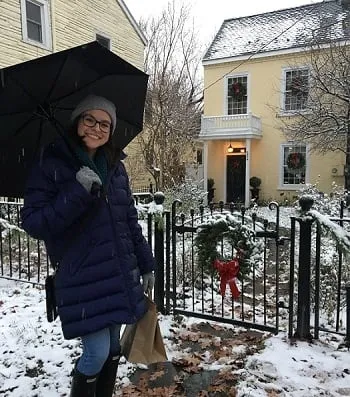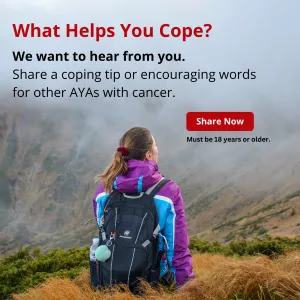Advocate Spotlight: Miranda Johnson, Washington, D.C.

Starting in 2018, the Cancer Policy Institute will be profiling advocates who have been engaged in advocacy in their home state, their community, with elected officials, and more. Read on to learn more about Miranda Johnson, our featured advocate for March, and her advice for getting involved in advocacy in your own life. If you are interested in learning more about policy, advocacy, and ways to get involved, sign up to be a part of the Grassroots Network.
Tell us a little bit about yourself.
I’m 24 years old and I’m from Irvine, California. I have a younger sister named Caitlin and two miniature poodles named Cody and Jack. I majored in English and Art History at Gettysburg College in Gettysburg, Pennsylvania and I studied abroad in England during my junior year. During that time, I traveled to Italy, France, and Ireland.
How did you get connected with the Cancer Support Community?
I became connected with the Cancer Support Community when I attended a panel discussion at Kramerbooks & Afterwords in Dupont Circle called “State of Cancer Research.” When I was 22 years old, I was diagnosed with a type of cancer called Liposarcoma. Liposarcoma tumors start out in fat cells in soft tissue and the tumor that I had was in my left thigh. About a year later, I had a recurrence – also in my left thigh – and, after two very invasive surgeries, I chose to do radiation therapy as a preventative measure. I went to the panel discussion at Kramerbooks a couple of weeks into treatment and Elizabeth Franklin with the Cancer Support Community was one of the panelists. When I heard her talk about survivorship, I realized that I had never heard anyone talk about that in the context of cancer. It never even occurred to me that there were all of these resources to help people who had stepped into a new phase of their lives “post-cancer.”
Did you have experience with advocacy in any capacity before joining CSC? (e.g. legislator meetings, hosting educational events, writing letters or calling, writing pieces for media outlets, posting on your personal Facebook, sharing information with your community, etc.)
I didn’t have any experience with advocacy before joining CSC. At about the same time I attended the panel discussion at Kramerbooks, I attended a film screening and panel discussion for a dear friend of mine who is fighting metastatic breast cancer (MBC). There was a hashtag that you could post while wearing this pink lipstick lobby color that they handed out at the event: #KissThis4MBC. Every time that hashtag was made public on social media – along with a selfie wearing the lipstick – Novartis would donate $10 to Metastatic Breast Cancer Network (MBCN) and METAvivor. Participating in the #KissThis4MBC campaign was probably my first moment as an advocate.
In what ways have you been involved with advocacy with CSC?
I became the Policy & Advocacy Intern in January of 2018. During my time interning with the Cancer Policy Institute (CPI) at the Cancer Support Community, I have contributed to blogs, conducted policy-related research, and drafted social media postings. I’ve had the opportunity to attend all-day roundtables and a meeting at the Rayburn House Office Building.
Is there one issue you are particularly passionate about?
I feel particularly passionate about survivorship and young adults with cancer or who have had cancer. Since becoming connected with CSC, I have realized the profound impact that my voice as a cancer survivor can have.
I also started attending DC Young Adult Cancer Community meet-ups at the Smith Center for Healing and the Arts. I have met people who are just like me and it has made a world of difference. Being diagnosed with cancer as a young adult is entirely different from being diagnosed in your 60s or 70s. You have different priorities and concerns.

What is one tip or piece of advice you’d like to share with others who are interested in becoming an advocate?
I would say that you don’t need to be an expert in policy in order to advocate for something that you feel strongly about. Having a personal connection to an issue is part of what will make the work that you do resonate with so many people. It will drive your passion to do more research, learn about the issue, and look for ways in which you can contribute and help people.
Tell us something fun about yourself—any hobbies, interests, or fun facts?
I love distance running. I ran cross-country all throughout high school and college and it has connected me to so many incredible people. One of my role models is Gabriele Grunewald. She is a professional middle-distance runner and cancer has come back three times for her. First, she had adenoid cystic carcinoma (ACC). Then, she had thyroid cancer a year after her first diagnosis with ACC. Then, ACC came back two times after that. When I had my recurrence last summer, I remember coming across a post that she made on social media. In the picture, she was in a hospital gown, getting ready to go into surgery. In the caption, she wrote, “The pre-op mantra: Anything painful or uncomfortable happening during this hospital stay is not being done to me, it is being done for me – for my benefit. The only way out is through.” I remember being so humbled when I read that. I like to think that my love for distance running helped connect me to a role model when I needed it most in my life.